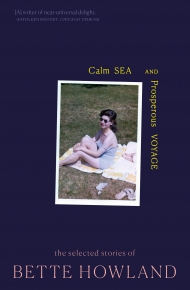Deborah S. Pease (1943-2014)
• August 18, 2014
All the Observable Grace
It is difficultAmid so much disturbance
To step lightly into the narrow boat,
To let the current carry it
Into the wide, slow-moving river.
Difficult to embark on the indeterminate journey.
Difficult not to find defeat in hostile terrain,
Easy to lose all sense
Of the river’s promise,
Easy to forget how the sun contends with shade
In ever-extending clemencies as day begins.
It is difficult to reach the shore
From arid plains, difficult to imagine
The ease of drifting.
Life begins
On the sloping river bank.
Minnows wheel in the shallows.
Trees on either side blend their reflections.
Light appears to emanate from underneath.
Birds are apprehended by their calls,
By the peace they call into being.
Only otherness
Allows the tentative step
Into the narrow boat, impels a casting off
Of customary gravity.
Coolness washes the face in sun-measured warmth.
A cleanliness is laid upon habitual usage.
Aquatic creatures plow delicate wakes
Criss-crossing all that was known
And is known again.
It is difficult not to wish
To live this way forever
In all the observable grace.
Day changes
In the manner of a face becoming old.
Night nears.
A log juts
Pronged with antlers.
Ahead lie clouds and islands, glazed tributaries,
A wideness, river-lakes, washes of blue,
Pale-hued supplicants.
Waters reclaiming the earth.
Nothing Is More Difficult
Nothing is more difficultThan being
A Human Being
(This is less obvious than it sounds).
We are not
Quite
Intended to be
Here
At all, yet here
We are, beings
Who cannot be.
The first word
That she spoke
With considerable authority
And insistence
Was: Moon.
(A little girl pointing
At a full moon, saying:
Moon moon moon moon.)
Always awash
In conjured moons.
48 Big Daffodils
48 big daffodils blared yellowFrom three vases in this room.
I was not expecting joy
But it arrived, brashly delivered
By flowers smelling of earth, primitive
In form and scent, bold enough
To grow through snow.
The florist's card with the sender's name
(So eagerly searched for in the past, the name
With its terrible power to thrill,
The name alone was what mattered)
Disclosed its unrushed secret:
"Happy spring. Love, Auntie"—
And I did not spit in despair.
Like the color (blatant solar flare), the joy
(What else to call it?) was childlike.
I did not think a child
Still lived in me, but with 48 big daffodils
Igniting my room
For their two-day lives
Here, there was spring.
Pierrot and Peonies
after a painting by Jane Freilicher
Inviting yet distant
Familiar yet strange.
She finds herself at once
Suspended in a formal peace.
All is simple and calm
Like slowly revealed truth
In the domain of uncapricious gods.
All her experience is slightly altered
And reflected back to her.
Pierrot and the white peonies
(His counterpart Pierrette)
Enact a stately pantomime
On the sturdy tabletop
In a swath of golden field.
The outdoor table floats
In ambiguous space.
The painting is ordered
(In its grandly disordered elements)
By the composure of sorrow.
She dreams of the painting,
Dream inside dream,
And breathes the summer air
Of still another life
Vanishing inside the heart.
The Sorrow of Leaving
What happensWhen you leave
Is this:
You have left
Some time ago
And I am left
To mourn your going
While you're still here
Yet also
There, cleft,
Cloven-hooved for sure-footed
Flight, no longer
Five-toed, solid, and here.
The space
Where you stood is what
You occupy
Now, your disappearance
Stalled so transitorily
That I almost
Loathe you
As a cunning joke
But since
I love you I leave too
Before you know
What's happening
I'm gone, only
A figured shaft
Of air
Spirals in the doorway,
A skin of patterned
Nothing, deceiving
Neither one
Of us for you know
I slide away like this
So you undergo
Your metamorphosis sooner
So you'll be the first
To leave, thus we counter
The sorrow of leaving
In surreptitious ways
Always knowing we
Are always leaving.
Traveler
The timing is perfect.Everything's ticking
Like an antique clock,
Minutely precise.
I wonder, as I walk
This short block to your house,
How on earth
I ever got here, this joy
Is more complex
Than a lunar expedition
Or color shots of Mars.
So many junctures
Might have slipped,
So many connections
Could have faltered.
All the way
I waited for mistakes
But nothing went wrong
I'm here right
On schedule, the taxi left me
At the corner.
I'll walk to your door
Stretching the muscles
Of my bated elation.
I know, as I leap across puddles
with balletic élan (even in boots)
And forge intimate links
With salient details (a piano
Played in that house, a crocus
Snug against winter-lingering earth),
I know I will walk
Down this quiet street
A thousand times
Before reaching you, again,
In memory, a thousand miles away.
Back to Top
Categories
Archive
About
A Public Space is an independent, non-profit publisher of the award-winning literary and arts magazine; and A Public Space Books. Since 2006, under the direction of founding editor Brigid Hughes the mission of A Public Space has been to seek out and support overlooked and unclassifiable work.
Featured Title

"A ferocious sense of engagement... and a glowing heart." —Wall Street Journal
Current Issue

Subscribe
A one-year subscription to the magazine includes three print issues of the magazine; access to digital editions and the online archive; and membership in a vibrant community of readers and writers.
Newsletter
Get the latest updates from A Public Space.
